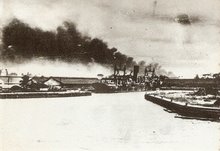Hua Jones writes....
My father, Arthur John Jones, died in 2011 at the age of 92. During his life he sometimes referred to his time in the RAF as a flight mechanic/rigger, particularly in India (Peshawar I think) and Singapore.
In relating his story about leaving Singapore I hope it might “ring a bell” with someone. As a child of the fifties I have been fortunate not to have witnessed the things that my father did, I therefore feel that the stories I recall may have been censored.
He was in RAF 36 squadron working on Wildebeests and Swordfish and described being on the base during bombing raids when the “old hands” like him, would just roll under their bunks as the Japanese methodically bombed the officer’s quarters and the cookhouse.
He was always adamant that he was on the last ship out of Singapore (I assume that many ships were the “last” ship) but he described his experience as follows. He was ordered, with some other RAF men to go up to the hill where there were British troops overlooking the straits. He had been told that they (the troops) had spare shaving kit etc. And that they were to collect it and report to the dock. In conversation the troops told him they would be on the next boat out – the one after his – but he always maintained that this would not happen as he was on the last boat - a fact which he did not pass on to the soldiers.
My recall is that he says he left Singapore on the SS Mendoza which I suspect is incorrect – either in my recall or his. However he told a story that they were instructed to liberate anything (loot) which might help them survive the passage out of Singapore. The only “food” they could find was tinned asparagus and boxes of chocolate which they loaded on the tramp steamer that was taking them out. As he walked along the dock with an armful of boxes of chocolates a submariner called him over to his docked vessel and asked could he have a box of chocolates, to which my father said “yes”. The submariner told him to wait a moment and disappeared. He re-appeared with a book, a Pears Cyclopaedia, which he gave to my father. When he tried to refuse it the submariner said “one thing on one thing off”. He still had the book in 2010 but after his death it had disappeared from his effects.
He only talked about his voyage from Singapore in his last years, I believe they were attacked by Japanese aircraft and he told me they were pursued by a Japanese warship but escaped by hiding in a shallow river in Sumatra where the warship could not follow. Other stories involved the captain of the all India women’s hockey team – which, as any child would I found embarrassing and didn’t pursue too far.
Interestingly though he described an Anglo Dutch matriarch and hospital matron who, with her daughter, entertained him and some other colleagues on his way out to Singapore (would it have been in Java?). His descriptions were very vivid and when, one evening I watched a documentary on the facts behind the fictional series Tenko, one of the women the series was based on was being interviewed. I telephoned him immediately and he confirmed it was his hostess from around sixty years previously.
I am visiting Singapore in a few weeks time so my father’s stories a very real to me at the moment, I hope these ramblings are of interest to you and that they might help someone give me a few clues to research.

